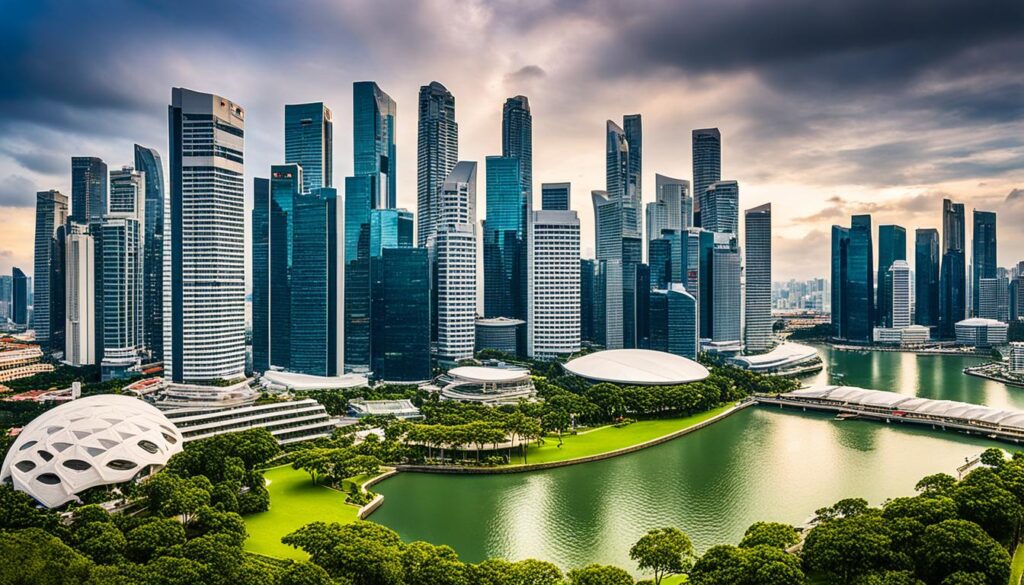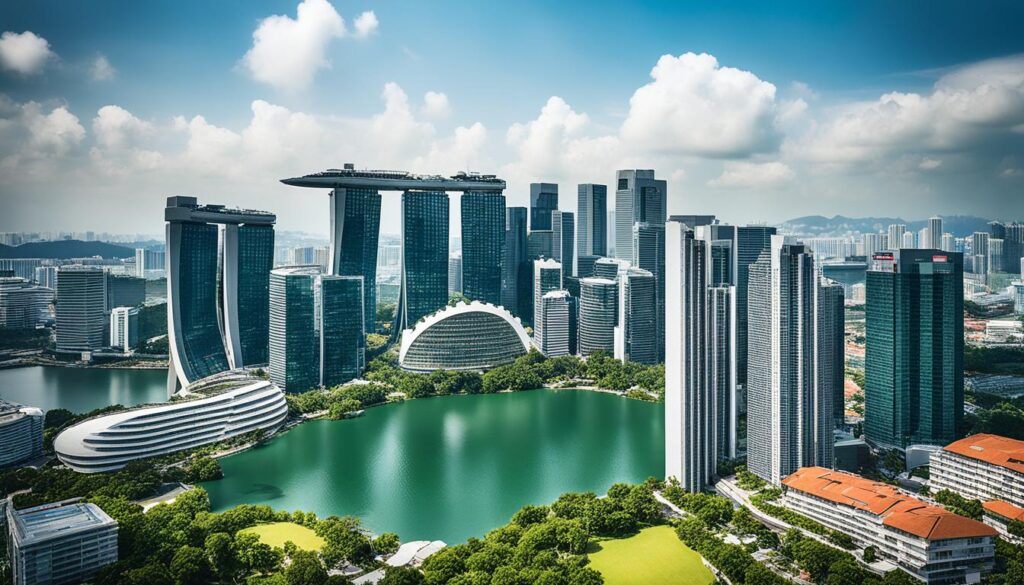
Imagine the soft hum of a bustling city intertwining harmoniously with serene pockets of tranquillity—a metropolis that’s vibrant yet comforting. This is the essence of Singapore, an urban mosaic where countless stories unfold within the walls of its homes and the streets of its varied neighborhoods. As the quest for the perfect dwelling persists in 2024, the fabric of the Singapore housing prices weaves a complex yet captivating tapestry for prospective homeowners. It’s a landscape that is dynamic and resilient, reflecting the dreams and aspirations of its residents. Whether you’re drawn to the pulse of urban living or the hush of suburban lush, the best neighborhoods in Singapore beckon with open arms, offering a place to call home amidst a skyline that’s always evolving.
In the realm of Singapore Residential Property, each decision shapes the future, balancing the scales of desire and practicality. It’s not merely about locations and square footage; it’s about finding that sweet spot—the nook in this global hub that resonates with your life’s melody. Navigating through the multitude of options can be both an adventure and a challenge, but with the right guide, the journey to your dream abode is within reach.
Key Takeaways
- Understanding the variety of property options available, including HDB flats, executive condominiums, and private residences.
- Navigating Singapore’s robust housing market with an informed perspective on prices and property types best suited to your needs.
- Comprehending the advantages of financial aids such as the CPF housing grant and their impact on homeownership.
- Discovering how government policy shapes the real estate landscape and influences housing affordability.
- Identifying prime investment opportunities and vibrant communities within Singapore’s best neighborhoods.
Understanding the Singapore Residential Property Landscape
The Singapore real estate market is a well-oiled ecosystem, distinctively partitioned into public and private housing sectors. Navigating the Singapore property market trends requires an in-depth understanding of the intricate frame that forms this robust landscape.
At the core of public housing is the Housing & Development Board (HDB), known for its meticulously planned flats which accommodate a vast majority of the Singaporean populace. HDB’s purchasing schemes are manifold, tailored to meet the diverse needs of its residents. Below is a snapshot of the notable schemes available:
- The Public Scheme, primarily for married couples or families
- The Fiancé/Fiancée Scheme, enabling engaged couples to plan ahead for their future
- The Orphans Scheme, designed to assist orphaned minors in securing a home
- The Joint Singles Scheme, giving singles the opportunity to co-own a residence
On the flip side, the private sector exudes variety, presenting options like executive condominiums, upscale apartments, and traditional landed houses. These types of properties often attract a blend of local and international buyers, underlining Singapore’s appeal as a cosmopolitan hub for real estate investment:
- Executive Condominiums serve those looking for a touch of luxury with a gentle entry price.
- Private Apartments and Condominiums provide a modern lifestyle, coupled with freedom and exclusivity.
- Landed Properties reflect tradition and stature, offering spacious living arrangements and privacy.
As 2024 unfolds, the Singapore housing market is experiencing a recalibration of rules and financial frameworks, significantly impacting the overall buying and investment process. It is essential for market participants – be it homebuyers or investors – to stay attuned with the recent legislative adjustments and financial trends that continue to redefine the real estate canvas of this city-state.

Understanding these foundations will complement buyers and investors in making enlightened decisions amidst the evolving tides of the Singapore property arena. Whether chasing the dream of homeownership or strategizing for robust property portfolios, the knowledge of these structural market elements is indispensable.
Types of Available Residential Properties in Singapore
Prospective homeowners and investors have a broad spectrum of options within the Singapore Residential Property market, each providing unique opportunities and lifestyles. From high-rise luxury condos in Singapore to the exclusivity of landed property in Singapore, the real estate landscape caters to diverse preferences.
Housing and Development Board (HDB) Flats
HDB flats lie at the heart of Singapore’s public residential housing sector, offering affordable living spaces with a communal spirit. Tailored to meet the needs of Singapore Citizens and Permanent Residents, HDB flats come with supportive schemes to accommodate various family setups and financial capabilities.
Executive Condominiums (EC)
Representing a bridge between public housing and private property, Executive Condominiums (EC) serve as an attractive middle-ground for those seeking an upgrade in comfort and status. These properties provide access to premium facilities often found in private condos, while still being partially regulated by public housing rules during their initial sale period.
Private Apartments and Condominiums
The allure of private apartments and condominiums in Singapore lies in their modern amenities and lack of ownership restrictions based on citizenship. Both local and foreign investors are drawn to the high-end features and prime locations of these dwellings, making them a coveted choice for luxury living.
Landed Housing in Singapore
Landed properties represent the pinnacle of residential luxury and exclusivity in Singapore. They are the property of choice for those who value privacy, space, and the prestige that comes with owning a ground-oriented residence. While generally reserved for Singapore Citizens and Permanent Residents, foreigners may also purchase landed property with specific government approval.

Eligibility Criteria: Who Can Buy Property in Singapore?
When considering buying a house in Singapore, understanding the official eligibility requirements is essential. The vibrant city-state has established specific guidelines to ensure structured and fair acquisitions in both the public and private housing sectors. Here is what prospective homeowners need to know:
- Citizenship: The first and foremost aspect to look into while planning to purchase a property in Singapore is one’s citizenship status. Singapore Citizens (SCs) have the widest access to different types of housing options, whereas Permanent Residents (PRs) and foreigners face more restrictions, especially in the public housing market.
- Age: Potential buyers must have crossed the age threshold of 21 years to be eligible for both public and private housing purchases. This same age limitation holds across the diverse array of housing types available.
- Family Nucleus: For public housing, particularly for HDB flats, applicants should form a valid family nucleus as per the stipulated government definitions. This may include a spouse, children, parents, and siblings, and can affect the type of grant and housing options available.
- Executive Condominiums (ECs): These unique residential properties come with their own set of eligibility conditions that vary depending on the period passed since project completion. The criteria diversify further, providing a spectrum of purchasing rights for SCs, PRs, and foreigners.
- Income Ceiling: There are also income ceilings in place particularly for buyers looking into subsidized housing options like HDB flats and ECs. These restrictions help to maintain affordability for the targeted demographic.
It is imperative for interested buyers to conduct thorough research and seek expert consultation to ensure compliance with all eligibility requirements prior to embarking on the journey of buying a house in Singapore. The criteria may evolve, so staying well-informed of the latest updates and regulations is advantageous.
Singapore Residential Property: Navigating the Financial Considerations
As we delve further into the world of Singapore residential property, a comprehensive understanding of the financial landscape becomes indispensable. Singapore housing prices are only one facet of the overall fiscal responsibility that comes with property ownership. Prospective buyers should arm themselves with knowledge about the diversity of home loan options, the reality of additional purchasing costs, and the significance of CPF Housing Grants, all of which play a crucial role in a sustainable property investment.
Home Loan Options
Securing a home in Singapore often begins with finding the right loan that aligns with your financial situation and property goals. With competitive interest rates and varying loan tenures available, choosing the perfect mortgage can be a balancing act between monthly affordability and long-term financial planning. Prospective homeowners must consider factors such as loan-to-value ratio, loan tenure, and fixed versus floating interest rates.
- Fixed interest rates offer stability against market fluctuations, while floating rates can provide savings during periods of economic downturn.
- Loan-to-Value (LTV) limits determine the maximum amount a bank can lend you, which currently stands at up to 75% of the property’s value for bank loans.
- Loan tenure can impact both your monthly repayments and the total interest paid over the life of the loan.
Breaking Down the Costs of Purchasing
Apart from the listed price of a residential unit, there are several costs potential buyers must budget for when engaging in the Singapore property market. From initial down payments and stamp duties to legal fees and taxes, understanding these associated charges will provide a clearer picture of the total financial commitment required.
- Down Payment: Often a combination of cash and CPF funds, the down payment is a percentage of the purchase price that must be provided upfront.
- Buyer’s Stamp Duty (BSD) and Additional Buyer’s Stamp Duty (ABSD): Payable duties based on the property’s purchase price or market value, whichever is higher.
- Legal and Agent fees: Engaging legal and real estate professionals will incur additional costs but are essential for a smooth transaction.
Understanding CPF Housing Grants
The Central Provident Fund (CPF) Housing Grants are a form of financial assistance provided by the government to help eligible buyers reduce the upfront costs of buying a home, thereby making Singapore housing prices more manageable. These grants can make a significant difference in overall affordability, especially for first-time buyers looking at HDB flats or Executive Condominiums (ECs).
- CPF Housing Grant for Family: A grant for eligible buyers who meet certain criteria based on citizenship, income, and type of flat being purchased.
- Additional CPF Housing Grant: Income-specific grant designed to aid lower to middle-income households in acquiring their first home.
- Proximity Housing Grant: For families who purchase a resale flat near their parents or married child to promote family cohesiveness.
By scrutinizing these essential monetary considerations, those seeking to join the league of Singapore homeowners will be better equipped in their financial journey. A precise evaluation of one’s fiscal health and the various financing mechanisms at play is key to a rewarding investment in Singapore’s residential property market.

Emerging Trends in the Singapore Real Estate Market
As the Singapore property market pivots into 2024, discerning investors and homebuyers are tracking several significant trends that will likely shape real estate dynamics in the upcoming year. The landscape of urban living is undergoing a transformation influenced by socio-economic developments and changing consumer preferences.

The latest analysis highlights trending movements that both sellers and purchasers must consider:
- The occupancy cap for tenants has seen an upward revision, signaling a growing preference for shared living spaces and co-housing arrangements.
- A noted drift from fixed-interest home loans toward more flexible financing options could reshape the lending marketplace.
- There is a burgeoning appreciation for aging mixed-use properties, which are increasingly seen as valuable investments with potential for creative rejuvenation.
- Notably, the Central Core Region is undergoing a market correction after a period of over-supply, setting the stage for potentially moderated pricing structures.
- The resolution of supply constraints has been instrumental in stabilizing real estate prices, presenting a more predictable market for stakeholders.
- Proximity to Mass Rapid Transit (MRT) stations continues to be a critical factor in property valuation, highlighting a cultural shift towards convenience and sustainability in daily commutes.
The current evolution within the Singapore property market suggests that investors and locals alike are moving towards more sustainable and communal living experiences while balancing price stability and location convenience. Monitoring these Singapore property market trends is crucial for achieving success in the real estate venture within the region’s dynamic urban environment.
Impact of Government Regulations on Singapore Housing Prices
The Singapore real estate market is subject to the influence of thoughtful government intervention designed to ensure stability and affordability. Recent adjustments in government regulations, particularly through cooling measures and adjustments to the Buyer’s Stamp Duty (ABSD), demonstrate the government’s commitment to a sustainable property market. These regulatory efforts have significant implications for Singapore housing prices and the general health of real estate dynamics in this bustling city-state.
2024 Cooling Measures and Buyer’s Stamp Duty (ABSD) Impact
With the introduction of enhanced cooling measures in 2023, Singapore’s housing market saw immediate effects reflected in buying sentiments and pricing trends. The revisions to the ABSD, including increased rates for foreign purchasers and developers, are amongst the most prominent measures expected to permeate the market into 2024. Aimed at curbing speculative buying and promoting a more equitable market, the repercussions these measures have on Singapore housing prices cannot be overstated. Market analysts continue to observe these trends, with many anticipating a tempered growth rate in home prices in response to these policies.
Rental Market Dynamics
In parallel to purchase prices, rental market dynamics in Singapore are also being reshaped by recent regulatory changes. As the market adjusts to post-pandemic norms, reports from the second quarter of 2023 highlight a stabilization of rental rates. This is, in part, a reaction to the regulatory environment that seeks to manage the demand-supply equilibrium within the real estate sector. These dynamics present both challenges and opportunities for investors and tenants looking to navigate the Singapore housing market in the coming year.
Prime Locations for Investment: Best Neighborhoods in Singapore
When it comes to real estate investment in Singapore, location is everything. Investors and future homeowners look for areas that not only promise a comfortable lifestyle but also offer potential for capital growth. Among the many factors influencing investment decisions, some neighborhoods stand out for their unique blend of amenities, accessibility, and luxury living. Identifying the best neighborhoods in Singapore is paramount for those eyeing valuable investment opportunities or searching for their dream home in this vibrant city-state.
In the pursuit of luxury condos in Singapore, one cannot overlook the allure of the city center. With its glamorous skyline, these areas offer a cosmopolitan lifestyle that’s difficult to match. These luxury condominiums are not just residences but gateways to high-end amenities, including infinity pools, sky decks, and concierge services, all enwrapped in the vibrance of city life. Key neighborhoods in this category include:
- Marina Bay
- Orchard Road
- Sentosa Cove
For those inclined towards quieter, more laid-back environments, the landed property in Singapore provides a resplendent retreat from the city’s hustle and bustle. The suburban districts boast sprawling homes fusing space, privacy, and tranquility, making them ideal for families or individuals craving a serene abode. Some top neighborhoods for landed properties are:
- Bukit Timah
- Seletar
- Holland Village
Connectivity remains a cardinal point when considering the best neighborhoods in Singapore. With a world-class public transportation network, proximity to MRT stations enhances the value of any property. Neighborhoods with robust MRT links enable seamless transit to business hubs, shopping complexes, and recreational venues, heightening their desirability for both living and investment purposes.
From luxury condos gazing down on the heart of Singapore to landed estates nestled in its green peripheries, the choices for both opulence and comfort are endless. For savvy investors and discerning homebuyers, these neighborhoods not only promise a premier address but also herald a prudent asset in their investment portfolio. As we look ahead, the best neighborhoods in Singapore will continue to captivate with their blend of luxury, lifestyle, and legacy.
Future Developments and Real Estate Investment Trusts (REITs)
As Singapore’s property market looks forward, identifying prospective growth areas and diversified investment opportunities remains essential. Singapore Real Estate Investment Trusts (S-REITs), key players in this sector, offer investors a unique vantage point into the commercial real estate market. These platforms allow investment in a range of sectors, such as retail, office, industrial, and hospitality, expanding an investor’s portfolio beyond residential assets. In 2024, the focus on S-REITs, as well as their response to economic conditions following global shifts, are poised to significantly impact investment strategies within the Singaporean landscape.
Understanding S-REITs
Investing in S-REITs serves as an avenue for those seeking exposure to Singapore’s lucrative commercial real estate sector without directly purchasing property. These trusts are notable for their stable dividend payouts, derived from rental income, and for providing liquidity that direct property investment cannot offer. As they are traded on the Singapore Exchange, S-REITs provide transparency and regulatory oversight, ensuring investor confidence. As Singapore continues to mature as a financial hub, S-REITs may become even more attractive for their role in diversifying investments and providing potential inflation hedging benefits in a dynamic economic climate.
Notable Upcoming Projects and their Potential Impact
Looking ahead, surveillance of major development projects remains crucial in understanding future directions of the Singapore Residential Property sector, despite these developments being outside the S-REIT sector. Ambitious plans such as the transformation of the Golden Mile Complex herald a new wave of architectural innovation and urban reconfiguration. The reverberations of these changes on adjacent residential areas, market valuations, and investor interest will be subjects of great interest in 2024. Leveraging insights from these milestones will aid in predicting market moods and ensuring adepts maneuver their investment strategies in accord with these real estate currents.

